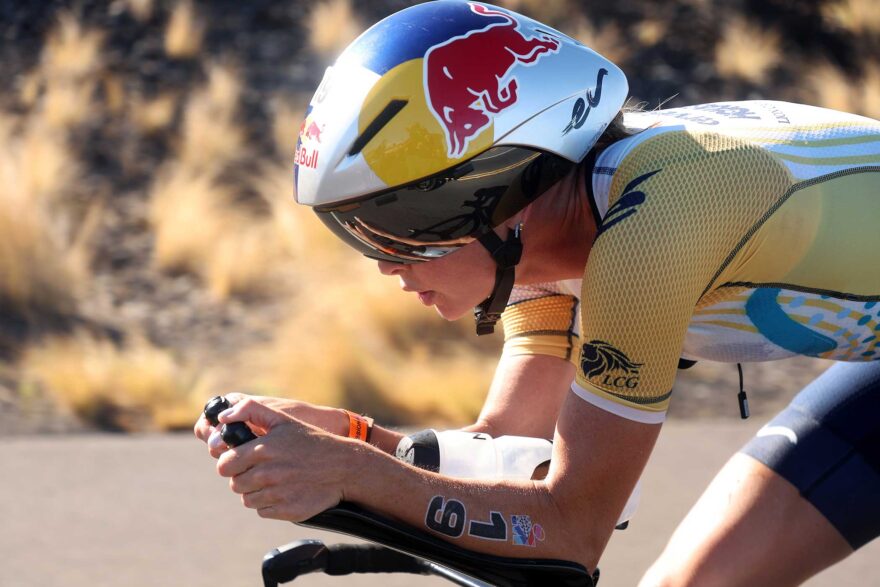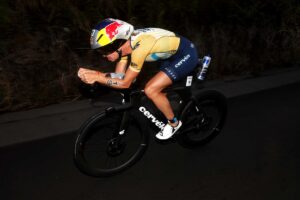
Image courtesy of Els Visser
Els Visser divides her wardrobe between scrubs and tri suits. As a medical professional and professional triathlete, you’re just as likely to find her in either outfit on any given day. Either career path demands enough energy on a daily basis to be more than a full-time job. Caring for others at their most vulnerable on top of chasing peak athletic performance on the world stage adds up to a staggering amount of stress.
Balancing the two would come at a cost for most.
But it’s the combo that gives Visser her edge across the board. Lessons learned earning her Ph.D. in surgery and working in public health have taught her more about how to endure as an athlete than any amount of time spent training on the bike, in the water, or on her feet. She’s got the track record to prove it, too: this 33-year-old HOKA athlete from the Netherlands has secured dozens of podium finishes as part of the pro field, including wins at IRONMAN New Zealand and IRONMAN Maastricht. This fall, she took 15th place, crossing the finish line in her HOKA Rocket X 2s in under nine hours on the course of the inaugural women’s only IRONMAN World Championships in Kona, Hawaii.
Visser has never been one to do anything halfheartedly. When she chose to take triathlon seriously while still in the midst of her doctorate, she didn’t take a conservative approach. Both medicine and athleticism held so much value for Visser that she knew she wouldn’t be satisfied just dipping her toes in either one. It was all-in from the very beginning.
“When you’re in the thick of it, you can do it,” Visser reflected. “You find a way. Waking up early to work on my articles, go train, come back to continue working. … I wonder how I did all that! But they were both such big passions for me, and I really wanted to succeed in both. If you have a passion, it doesn’t feel like work. You’re willing to put your time into it.”
Visser spent two years from 2017 to 2019 competing professionally in triathlon and finishing up her surgical Ph.D. By the time graduation rolled around, she realized that something had to give. “I didn’t want to fail in both,” Visser explained. “I also didn’t want to give up either one completely.”
So, she didn’t. Visser found her middle ground in public health. That way, she could steer clear of 10 hour days in the OR while still putting her doctorate to good use and pursuing her potential in triathlon. But the years of pulling double-duty at such a high intensity have stuck with her. They may even be the reason for Visser’s athletic success today.
How Medicine Made Visser A Champion
“It’s not the knowledge of the human body that helps me most as an athlete,” Visser explained, though that physiological expertise does aid in designing an effective training protocol. “What helps most is having a foundation of mental focus. In medical studies, we’re taught to zone in on what matters and the problem with the patient, not all the noise like what’s going on around us or what kind of person the patient is. In surgery, I had to be ‘on’ for hours and hours. It’s relentless. You have to be in a state of constant focus for 10 or more hours without any break. In long-distance racing you need that same hyper-focus in order to do your best. It’s such a mental aspect of races. I’m really well trained in that way.”
You can see that laser focus underlying Visser’s every move. Throughout the IRONMAN World Championship race, she maintained a calm and collected expression that never let on how hard she was actually working. Her soft but unwavering gaze remained fixed on the course ahead despite endless sources of distraction: crowds of spectators, flanks of fellow competitors, cameras in your face, loudspeakers in your ear … not to mention the persistent pressure of being one of 55 on the pro start list. Visser took it all in stride (literally) thanks to all the practice that she got in the hospital. Then, lives depended on her ability to block out the noise. Now, the stakes aren’t so high, but she can channel the same mentality.

Image courtesy of Els Visser
The fact that lives aren’t at stake serves as another impetus for Visser. She knows that racing isn’t anywhere close to the be-all and end-all for her. Yes, she loves triathlon — so much so that she completely changed her trajectory in order to accommodate a secondary career in it. At the same time, Visser views it as one of many outlets for her energy and ambition. She’s seen enough to understand that metrics don’t really matter. The act of chasing extremes in the first place holds the actual value.
“I’ve done my studies and realized that there’s more than sport. It’s important to do well and give my best to try and get the best result, but it’s such a small world. It’s not really about winning races. It’s about what it takes to do that.”
That perspective doesn’t just come from studying medicine. Visser survived a shipwreck off the coast of Indonesia in 2014, before competing in triathlons had even registered on her radar. She spent two days floating amongst the wreckage and fighting her way to shore, convinced that she had no chance against the odds but taking the bet anyway. There’s no “silver lining” to a disaster like that. But it did teach Visser how to prioritize the present moment.
“I see things in life that I didn’t before,” she said. “Things have more color, they’re deeper and more intense. I was always very driven, but now I’m more focused on where I am in the process toward my goals and enjoying every second, just grateful that I’m here doing it. I think that keeps me grounded.”
What’s Next for Els Visser?
Visser has shifted her goals in medicine away from cleaning up after emergencies to preventing them from happening at all. She works with companies to help stave off burnout in their employees via stress management and active lifestyles. Visser also organizes triathlons and races for kids in the Netherlands as a way to instill healthy outlets for stress from a young age. She finds even more satisfaction in this area of medicine than she did in the OR.
“We all want to stay out of the hospital,” Visser said. “I work to keep people from going there at all. That’s better than treating them in the hospital.”
The more relaxed schedule allows her to keep pursuing her professional triathlete career without closing the door on medicine. She’s got her sights set on many more opportunities to climb the podium at the IRONMAN World Championships as well as other key races in the triathlon sphere.
Visser hopes to continue growing her kids’ triathlon program and at the same time to keep her passion as an athlete circulating back through her community.
Visser might not have taken the path that she planned on when she embarked on her doctorate journey. Athletic ambition surprised her and triggered an unexpected change in direction. The difference between Visser and her peers in the pro field, though, is that she didn’t let one passion overtake the other. She’s made tough decisions in the name of prioritizing her potential in triathlon, but never at the complete expense of her potential in medicine either. Visser has found so much value in the crossovers between the two that narrowing her focus even further would only stymie her success as a triathlete. Her achievements happen because of, not in spite of, her split attention.
There’s more to life than sports — and that realization can be an athlete’s greatest asset.
Lucie Hanes is an avid writer and adventurer on rock and trail with a passion for sharing her outdoor enthusiasms through journalism and mental strength consultation.
 Your Privacy Choices
Your Privacy Choices
 The
The